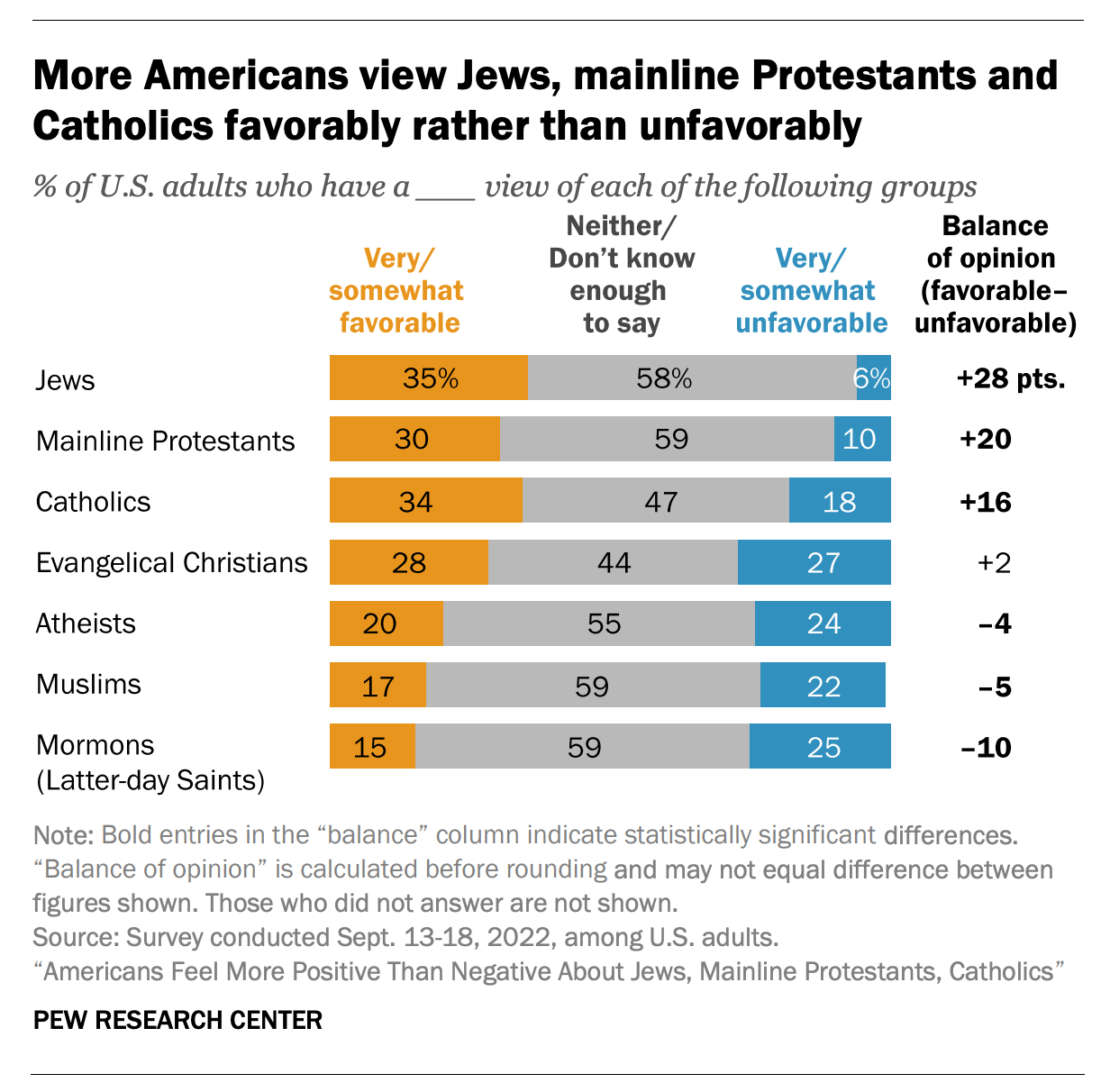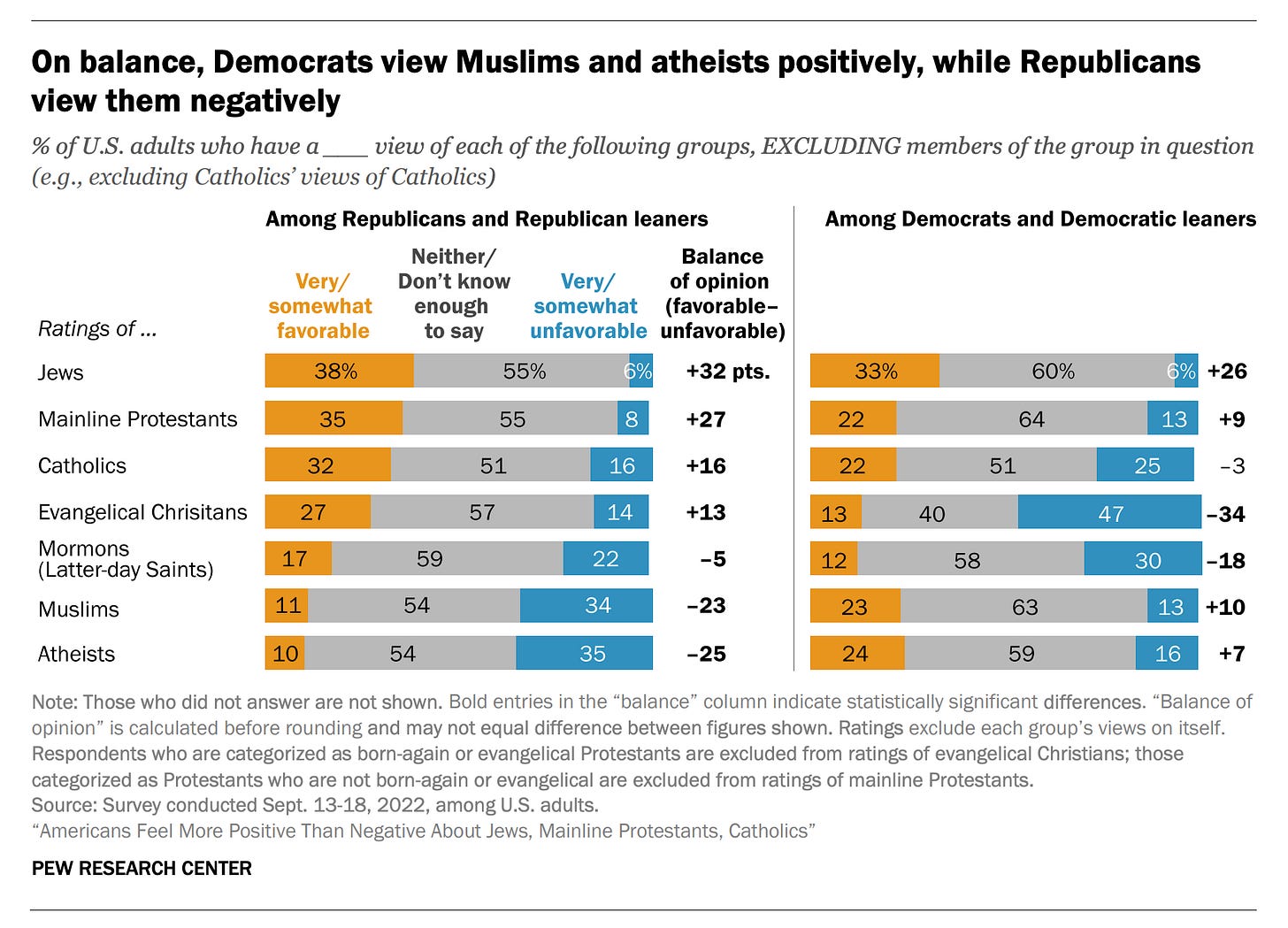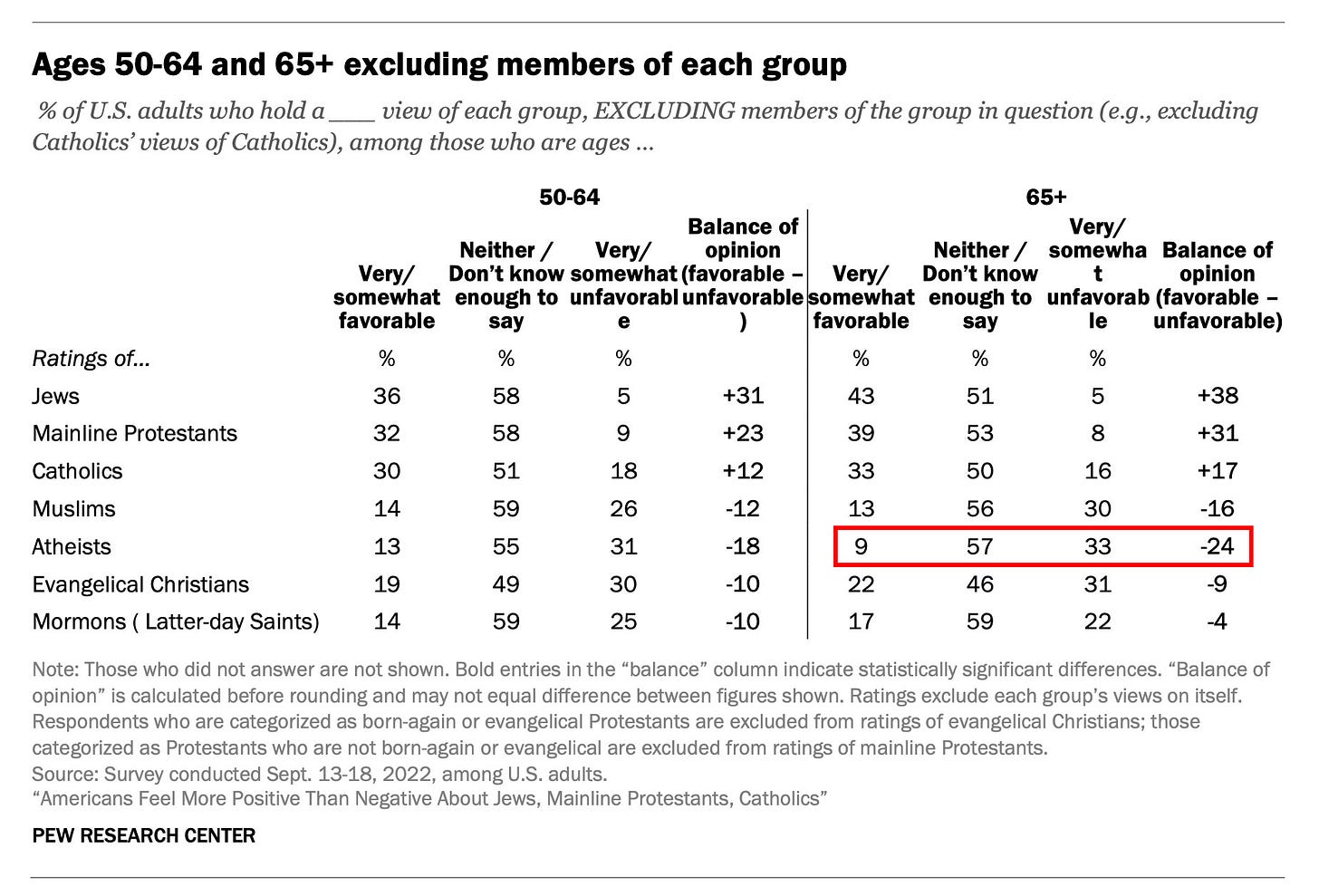Americans still view atheists unfavorably (but there's good news!)
The Pew Research Center reveals positive shifts in the way Americans view atheists
This Substack newsletter is free, but it’s only able to sustain itself due to the support I receive from a small percentage of regular readers. Would you please consider becoming one of those supporters? You can use the button below to subscribe to Substack or use my usual Patreon page!
Do Americans like atheists?
According to new research published today by the Pew Research Center’s Patricia Tevington, if you ask Americans what they think about atheists, the majority of them will respond with a resounding… ¯\_(ツ)_/¯.
55% of Americans say they don’t have enough information to offer their feelings about atheists one way or the other. Maybe that’s good. It suggests they’re persuadable since they don’t already have a negative opinion of us.
Of those who do have an opinion, though, slightly more Americans than not are not fans. 24% of Americans don’t have a favorable opinion about atheists compared to only 20% who do.
Still, you know what that makes us? Not an outlier.
That net favorability of -4% might strike atheists as disappointing at first, but it’s worth pointing out that Jews have the highest favorability rating among all religions… and it’s only at 35%. Atheists have a net favorability that’s slightly higher than Muslims and much higher than Mormons. So if nothing else, at least we’re not at the bottom…?
But maybe the data itself strikes you as unfair.
There are a lot of Catholics and Protestants in the country and they would undoubtedly favor their own groups over people like us. In that sense, they have an automatic edge in a survey like this because they simply represent more Americans. To get a more accurate favorability ranking, you would want to see what various groups think about all the other groups, not themselves.
Turns out Pew has those numbers too, and they’re much more interesting.
If you look at the “Atheists” column on the far right, you can see that evangelicals really dislike us—with a net favorability of negative 40%. That means waaaaay more evangelicals dislike us than like us.
The feeling is mutual. Atheists really dislike evangelicals (-76%). We also dislike Mormons (-55%), Catholics (-49%), and Mainline Protestants (-24%). Among atheists, Muslims do somewhat better than most of those other groups with a -17% net favorability. By and large, we don’t think favorably of other groups.
The only religious people atheists like, on the whole, are Jews… and we’re not alone because every religious and non-religious group likes Jews. They’re the only people with a net positive favorability across the board (or, in this case, down the column).
While atheists are strongly disliked by evangelicals (and Christians in general), we get much better numbers among agnostics (+45%), Jews (+19%), and Mormons (+6%). Why is that? I would argue that all of us are often victims of religious discrimination at the hands of conservative Christians, and there’s a kinship in that.
Also, Mormons apparently like everybody. They like atheists the least, and they still have a net positive view of us.
I’m a little surprised by how much people dislike evangelicals. Mainstream Protestants and Catholics are mildly okay with them, and Mormons love everybody, but Jews and every branch of the non-religious tree seriously oppose them. Sociologist Dr. Phil Zuckerman told me he saw this as a “repudiation of [Donald] Trump and his ilk… and the continuing branding problems that evangelicals will have because of him.”
Speaking of which, it won’t surprise you that, among Republicans who believe in God, atheists are strongly disliked. Only 10% of non-atheist Republicans have a positive view of atheists.
It’s not like Democrats are huge fans of us either, though. While 24% of (religious) Democrats like us, 16% don’t. Considering that atheists vote overwhelmingly for Democrats, we should really be getting more love there.
Dr. Juhem Navarro-Rivera, who writes the Secular Politics newsletter on Substack, told me he saw these results as the “politicization of religion.” In other words, people may be basing their views of religious groups on their typical political affiliations. Atheists might feel much more favorably about Jews and Muslims—and unfavorably about evangelicals—because we’re political allies. Similarly, the evangelical favorability numbers for Jews may have more to do, he said, with a “Pro-Israel attitude” more than anything else.
So is all of this good news or bad news? Believe it or not, I find it surprisingly positive.
There was a time when atheists were the least electable and most distrusted minority. One of the biggest “religion” stories over the past couple of decades has been how atheists have become more vocal and more willing to publicly use a non-religious label. And when religious people personally know atheists, it becomes that much harder to demonize us.
Dr. Melanie Brewster, a psychology professor who’s done extensive research into marginalized groups, said this was a trend worth watching:
With other groups like LGBTQ populations, knowing someone is one of the biggest predictors of tolerance and humanizing views, so I imagine we will see a sea change towards secular people as more of the country gets acquainted with atheists.
Indeed, over the past three years, Pew found, the percentage of Americans who say they know an atheist has gone up from 65% to 71%, a larger jump than any other group.
When I asked Pew about the age breakdowns, the numbers offered even more reason for optimism.
Among religious people 65 or older, only 9% have a positive opinion of atheists with an overall net favorability of -24%, lower than every other group.
However when you look at people ages 18-29, not only do they have a favorable view of atheists (28%) that’s higher than nearly every other group, our net favorability is positive 11%. It’s the only age group that likes atheists more than it dislikes us. Evangelicals, on the other hand, have a net favorability of -20%. Not surprising, given their bigoted and retrograde views on women, LGBTQ people, and the Republican Party in general.
Why such a drastic change? Young people are far more likely to know someone who’s openly atheist or openly queer. For many of them, conservative policies (fueled by religious fervor) have made their lives and their futures less secure. Even if they’re religious, cisgender, or white, so many of them have grown up in a country where faith-based bigotry and right-wing radicalism has always been a threat to their friends’ well-being.
While atheists have a long way to go to win over the hearts and minds of most Americans, the bottom line is that we’re still on the upswing. As conservative Christians continue waging wars on the most vulnerable populations, and doubling down on the least popular policy decisions, all while voting for extremists and wannabe dictators, decades of earned goodwill will fade away.
And if atheists as a whole stand up for religious freedom for everyone, all while making the case for why religion and morality are not intertwined, it’ll be a lot easier to get people on our side even if they don’t agree with our theological views.
(Featured image via miker / Shutterstock)









One of the positive outcomes of the internet age is how it has allowed people all across the free-thought spectrum to realize they are not nearly as alone as they once thought. People have begun to network as never before and the movement is growing. Organized religion loses ground every day they will never recover.
I find it ironic that the Jewish people are the most liked across the board, considering how much anti-Semitism pervades our culture. I’m not saying the data is wrong, but it may be their history of victimization that has created a feeling of sympathy for them. Hopefully this will result in a reduction in anti-Semitism overall. I mean, with MTG shouting about Jewish Space Lasers, it’s difficult to take the “Jews rule the world” seriously.